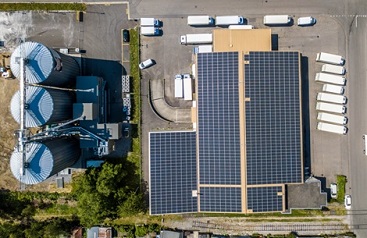
NATIONAL REPORT—Business owners face endless challenges of having to make risky decisions. From employee management to operations, cost reduction and customer retention top the list. One solution that takes care of both concerns simultaneously is commercial solar.
Understandably, with most blue-chip companies using the system, it seems expensive and off-putting. However, it has become a viable option for all businesses to capitalize and benefit from with its rapid evolution.
Reduced Overhead Costs & a Generous ROI
Like any good product, there are solar energy pros and cons worth considering. For example, one of the most significant benefits of solar panels is that they can lower and eliminate your energy bill. But the biggest deterrent is the hefty upfront costs.
Of course, any purchase that costs thousands of dollars is worth dissecting to determine its value. But solar panels are a long-term business investment, and, over time, the panels end up paying for themselves.
Additionally, there are short-term benefits to help lessen the pain and help reduce the barrier to entry. However, one option that looks like a benefit but is best avoided is leasing solar panels.
Leasing comes with a range of cons that can put your business at a disadvantage. For example, they can get repossessed with a single missed payment, you miss out on tax incentives, and you get a reduced return on investment. If paying outright isn’t an option, it’s generally better to finance your solar panel system rather than to lease.
Operating costs and overhead are two unpredictable aspects of any business that can create a nasty ripple effect. You can mitigate this risk by finding ways to predict your energy usage and future bills.

As a result of reduced energy use, quarterly budget planning is much easier. Commercial solar energy systems also offer the benefit of eliminating any concerns of rising energy prices.
If that’s not enough, solar panels are almost completely self-maintained. Barring any sudden meteor showers, all they require is annual cleaning. This helps maintain their durability and to provide power for their entire estimated lifespan.
When you take a few moments to note the financial pros and cons of solar energy, you’ll most likely find a generous return on investment in the long run.
Rebates
In addition to reduced overhead and bills, your business can utilize the federal investment tax credit. While many homeowners have taken advantage, it also applies to businesses. However, it’s good to note that the federal tax credit is only effective until December 31, 2023.
Commercial solar systems may also be eligible for additional rebates and incentives. These can come from the state, county, municipality, and the local utility company.
Somehow, getting paid by your local utility company feels like you have the upper hand. Some utility companies give performance-based incentives for the solar electricity your system generates. These companies will typically require that you have a grid-tied solar system.
That’s due to how the performance-based incentive operates. The payment itself is generally paid as a kilowatt-hour credit and is measured similarly to a metering process.
In most cases, you’ll receive the credits or payments monthly. The incentive rate is determined at the time of installation and is constant throughout the contract’s life.
If you have any additional questions, the most efficient method is to shop around and ask your local solar panel companies. They’ll have the most in-depth knowledge of any rebates and incentives offered to commercial clients in your area.
Build a Better Brand Image with Solar Panels
As mentioned earlier, customer retention is just as vital as cutting overhead costs. A recent study by The Economist Intelligence Unit showed an astounding 71 percent increase in online searches for sustainable products.

In other words, the business must show signs of sustainability. Consumers not only care about the products but also business practices. Ultimately, utilizing solar panels is an excellent marketing tool.
It shows your audience that your business is contributing towards a brighter future and is worth their hard-earned cash.
Additionally, solar panels will always become carbon neutral. However, it can take up to three years for the panels to pay off their carbon debt and achieve a neutral status. After the three-year mark, it continues to reduce and remains neutral throughout its entire life.
Are Solar Panels a Good Fit for My Business?
Solar panels are an excellent addition for many businesses. But no one can deny that there may be obstacles that may prevent some from taking immediate action.
Fortunately, increased adoption of solar energy has led to constantly decreasing costs. If solar panels don’t fit in the current budget, rest assured that they’ll become much more affordable in due time.
In the cutthroat world of business, perception is key. However, there’s nothing that says your business can’t gain positive publicity while making a difference. Solar energy systems benefit not only your business but also your local community and — eventually — the world.






